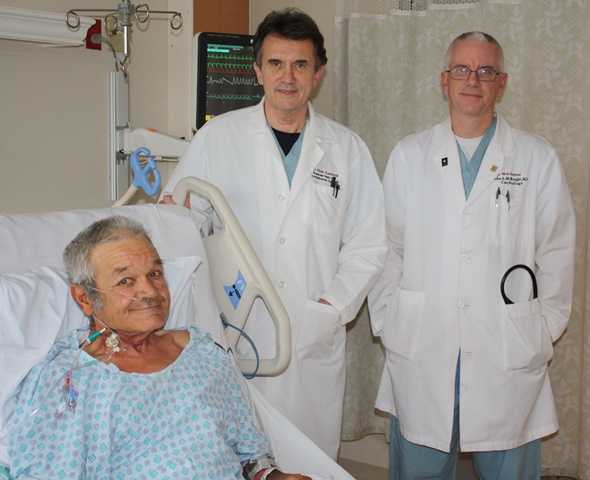Mon General surgeons perform dual minimally-invasive heart procedures
Posted Date: 11/6/2015
Mon General’s Cardiothoracic Surgeon Alexander Nagy, MD, and Cardiologist John McKnight, MD, pose with their patient, Samuel Dewitt, 61 of Bruceton Mills, West Virginia, less than 24 hours following his minimally invasive aortic valve replacement and stent procedure.

UPDATE: Mr. Dewitt passed away Feb. 1, 2016. Our deepest sympathy to Mr. Dewitt's family and friends.
"That surgery brought the life back in him. He was so happy and had so much more energy. I want to personally thank Mon General for his quality of life in his last few months. That long forgotten smile we hadn't seen in a long time was back. His smile went all the way to his beautiful blue eyes." - A friend of Mr. Dewitt
For the first time at Mon General Hospital, Cardiothoracic Surgeon
Alexander Nagy, MD, and Cardiologist John McKnight, MD, concurrently
performed two minimally invasive heart procedures.
Less than 24 hours later, the patient, Samuel Dewitt, 61 of Bruceton Mills, West Virginia, said he feels better than he’s felt in a long time. He’ll have to miss hunting season this year, but he’ll be discharged from the hospital within days.
Nagy and McKnight performed a Transcatheter Aortic Valve Replacement (TAVR) and double stent in the coronary artery.
TAVR is a minimally invasive procedure that replaces the aortic valve in patients like Dewitt who are not strong enough to endure open-heart surgery. For these high-risk patients, TAVR is often their best hope for any measure of quality of life.
With TAVR, surgeons insert a tiny device through a groin vessel or a small two-inch incision over the upper part of the sternum. Unlike open-heart surgery, there is very little blood loss with TAVR.
"This patient needed a new Aortic Valve and revascularization of coronary vessels. We were able to achieve both in one session, without opening the chest, all done percutaneously,” Nagy said. “TAVR represents a complete paradigm shift in heart valve surgery and the only truly minimally-invasive procedure.”
The TAVR performed Nov. 4 included the use of the new third-generation Sapien Transcatheter Heart Valve – another first for Mon General Hospital.
The third-generation Sapien includes an outer skirt designed to minimize paravalvular leak. The FDA approved the device in June 2015.
“We’re one of the only hospitals of this size in the country doing procedures like this,” said McKnight.
Following the TAVR procedure, McKnight inserted a double stent in the coronary artery. A stent is used to improve blood flow by treating narrow or weak arteries.
The doctors completed both procedures in approximately an hour and a half.
Nagy said the patient’s Primary Care Physician Robert Phares, MD, heard a heart murmur and sent Dewitt for an echocardiogram. The echocardiogram showed that Dewitt needed an Aortic Valve Replacement and Coronary Artery Bypass Grafting. After further assessment, Nagy and McKnight decided that the patient was a high risk candidate for open-heart surgery.
Before TAVR, high-risk patients could only been treated with medicine, which may not be effective for severe aortic stenosis.
Prior to the TAVR and the double stent, Dewitt said he was short of breath. He could barely walk from one side of the room to another. He was no longer able to ride ATVs or hunt.
The recovery time for the minimally invasive procedures is significantly shorter than the recovery time for open-heart surgery.
Following a TAVR, the patient wakes up in the operating room and is discharged within three to four days. The baseline recovery time for a TAVR patient is two to four weeks. An open-heart surgery patient is discharged within five to seven days with a minimum recovery time of six weeks.
Mon General was the first hospital in the region to offer TAVR. Two of the first TAVR procedures were performed in November 2013.
Dewitt said he is sore in the groin area but is otherwise feeling fine.
“I can tell you, I have excellent doctors. They tell you what’s what,” Dewitt said. “And the nurses, they’ve done an excellent job. They’ve been attentive to me.”
Dewitt smiled as a nurse came to his bedside.
“There’s trouble right now,” he said with a grin.
Popularity:
This record has been viewed 6046 times.